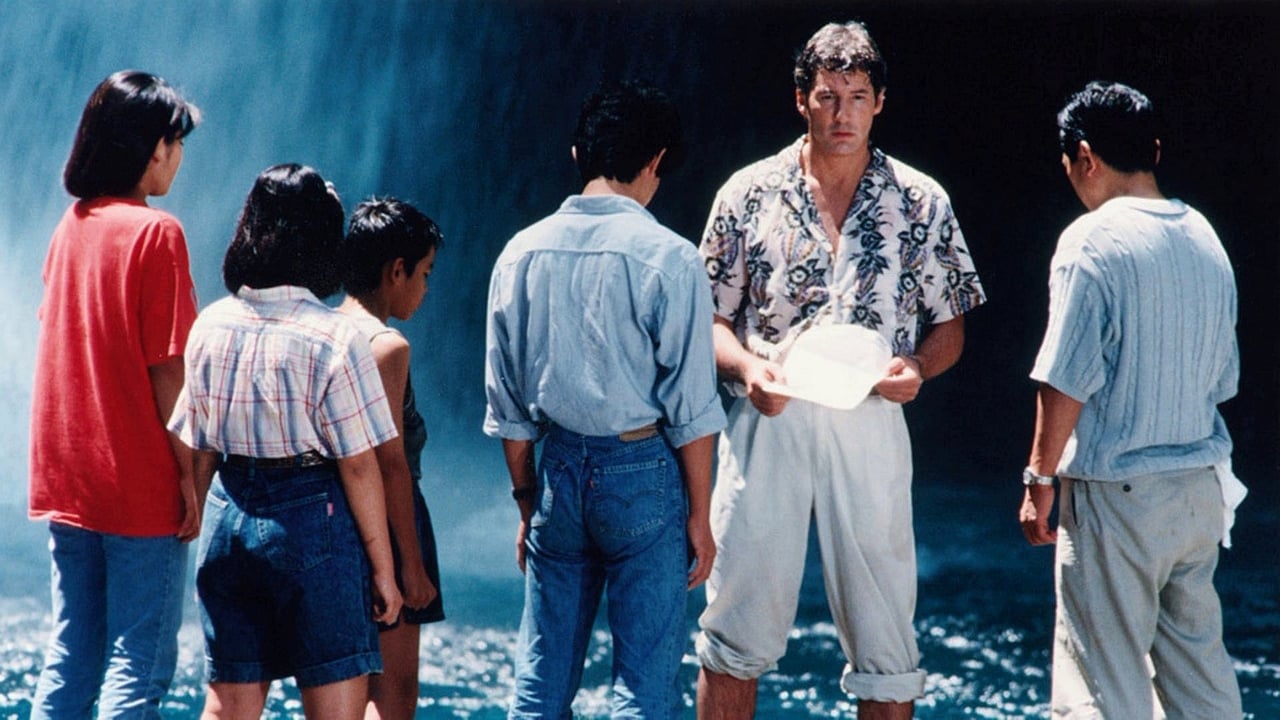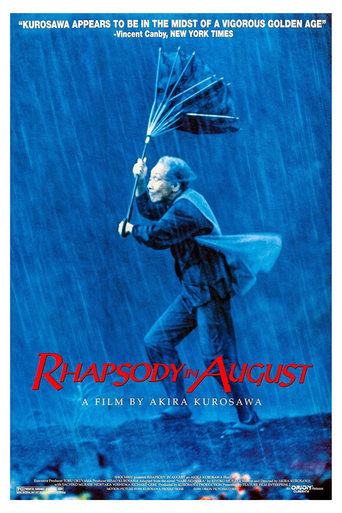

Rhapsody in August is a very small movie. It has little of Kurosawa's bravura cinematic flare and could well, from its look, have been made for television. Yet there is something rather lovely about this little thing.The movie is about children staying with their grandmother who learn that she has a brother living in America. She doesn't remember this brother, one of many siblings, some dead, and the children, eager for a trip to California, try and encourage her to remember.The grandma is lovely. The children seemed a bit unconvincing, speaking in stiff conversations and sometimes over-emoting, but maybe that's what children are like in Japan.The grandma lives near Nagasaki, where she lost her husband, and the children do some downbeat sightseeing.When I read user reviews of this movie, several were mainly just a description of the story, and I seem to be doing the same thing. I'm not sure what it is about this movie that makes one want to tell what happens, since really, not much does. It's an episodic film that is notable not for story but for lovely, quiet moments like the survivors of a school carefully tending the twisted jungle gym left as a memorial.Perhaps one wants to tell the story because the movie is made up of little moments, like a search for a mysterious tree or ants crawling to a rose, that don't on their own seem to mean much and yet in the context of the film are striking.There is something wandering about the movie, although since life does wander this may be a feature rather than a bug. Like the reviewers here, I don't know what to make of the final, overlong scene, and I would have preferred something else. But I am glad I saw this.
... View MoreAkira Kurosawa directs this 1991 film about three generations of a Japanese family who deal with the bombing of Nagasaki by US forces. The central focus of the film is a domestic drama between a old woman and her visiting grandchildren at her country home. Their parents are away seeing distant relatives in Hawaii, including a man who claims to be the grandmother's long lost brother. The kids convince her to go see him, but she's hesitant as she can't remember him - the rest of her family being killed in the nuclear blast.The movie focuses on her remembering her family and recounting to the kids stories of her past. In these quiet scenes of domesticity, Kurosawa maintains a level of serenity and allows the actors show off subtle, understated emotion (one example being early on when the grandmother, played by Sachiko Murase feels rejected when the children insist on cooking because they don't like her food).In comparison, when the kids go out to the city to find out more about the bombing, the movie becomes a bit overly dramatic, with classical music playing over the images of past sufferings (memorials, etc.). It didn't affect me emotionally as much as I would have wanted.Richard Gere's performance as the Japanese-American nephew is also a highlight of the movie. His scene where he apologies for the death of his aunt's husband in the bombing being an affecting one.Overall, I liked most of the movie - some of it I didn't like, but it's definitely worth watching for it's quiet dramatics, subtle themes and sometimes brilliant visuals.
... View MoreAkira Kurosawa is highly appreciated around the globe for his epic-samurai adventures. Even that he made his most well known films in 1950's-60's, his career lasted from the early 40's to the 90's. n result of creating a high reputation with his samurai-films, many tend to forget that he made several films set in modern time, for instance: the unforgettable Heaven and Hell (1963) and Japan's modern version of Hamlet, The Bad Sleep Well (1960). Also in 1940's, when he started, he made several crime films set in present. In the year 1970, Akira Kurosawa directed his first color film, Dodes'ka-den. It instantly became a financial and critical flop, leading Akira Kurosawa to the edge of attempting a suicide. Five years later he made the touching story of nature, Dersu Uzala (1975), which won an Oscar for the best foreign film. In 1980's he managed to create to films, that still are very appreciated among film industry, including Ran (1985), which is based on Shakespeare's King Lear. In the 1990's Akira Kurosawa had still time left to finish three films, from which Rhapsody in August is the second last. It is a beautiful touching story as it is a fine reflection of his own career.A lonely elderly woman, Kane lives in the countryside of Nagasaki, harvesting her plants and taking care of her grandchildren. She is living a peaceful care free life close to nature, but heavy memories of past lay in the modern city of Nagasaki. The memories of the bombings in the WWII, August the 9th 1945, which killed her husband and several siblings. As the memorial day approaches Kane hears that her only living brother is in Hawaiji in The United States. Her brother and her children ask her to travel to Hawaiji to meet her brother, and see their fortune, wealthy life. For Kane, leaving her peaceful life behind, forgetting the cruelty of the war and going to the western world isn't easy.The state in Rhapsody in August is very important. In Kane's house we see nature and beauty, we hear the sounds of wind and water. When the grandchildren go to the city of Nagasaki, we see modern architecture and memorials, we hear the sounds of traffic and people. We can sense the feeling of war in the city. In Kane's house, one of her grandchildren is trying to fix Kane's old organ. This is the motive of the film and is a reflection of Rhapsody in August's themes. Accepting your past, fixing it and the collision of new and old.Akira Kurosawa achieves to make a portrait of three different generations, showing youth, adulthood and elderly. This might remind one of Yasujiro Ozu's Tokyo Story (1953), but as didn't Ozu so didn't Kurosawa fall into underlining the imperfections of the adults. They're blinded by modern living, wealth and avarice. But Akira Kurosawa shows this very gently, what can you expect from a director who had been making films for 5 decades.When Kane's brother's son, Clark (Richard Gere) arrives from the States, the adults and the grandchildren (and the audience) assume him and Kane to start arguing, and to not get along because of their pasts. How Clark's home country killed Kane's husband. This is one collision of past and present. The other is between the grandchildren and Kane, how could the new generation ever understand the horrors of Nagasaki. The horrors that have been buried under the new modern city. Is it possible for them to understand each other? Akira Kurosawa often used rain as a symbolist carrier of narrative, in some of his films rain made the film, it was the motive and led the situation together, for instance Kurosawa's breakthrough Rashomon (1950). When knowing this it is very beautiful to watch the ending sequence of Rhapsody in August. Where Kane runs to the rain, which remind her of the war, which will never let her alone, the past that will never let go. Her children and grandchildren run after her as the "theme song" of the film plays. A very beautiful sequence. Rhapsody in August is beautiful and sentimental, it can also be watched as a reflection of Kurosawa's life. He made a film that showed the true beauty of humane emotions and life. Rhapsody in August is a great historical film too but mainly it's about the collision of past and present, that happens all the time.
... View MoreRHAPSODY IN AUGUST is not an anti-American film. Although some of the characters express anti-American sentiments, the film rejects them. And Richard Gere's character does not apologize for the atomic bombing (which would have been unforgivably presumptuous of Kurosawa). He apologizes for his family's ignorance of the fate of his uncle.But that's not to say that this is a good film. Kurosawa hectors the audience, which is a thing he hardly ever does. And surely Kurosawa could have found a more interesting American actor than Richard Gere to play Clark. And it is true that Kurosawa, while eschewing an anti-American stance, does try to pin the blame on "war," meaning that he tries to parcel the blame out equally. But of course, the blame for WWII isn't shared equally. Perhaps having Clark mention that his mother's brother died at Pearl Harbor, or making his wife a Chinese-American whose parents were murdered at Nanking, might have served as a prophylactic against this moral failing. Of course, this might have meant that Kurosawa would have had to come to terms with his own past as a wartime propagandist for the government which committed those crimes.Perhaps the silliest aspect of the film is its indignant insistence that Americans don't want to discuss the bombings.Please. We discuss it all the time. We debate, and we agonize, and we yammer endlessly about what might have happened, and what did Truman think might have happened, and what if this and what if that. We also talk about the firebombings of Tokyo and Dresden, the sellout to Stalin at Yalta, and all the other things we did which are at least morally questionable if not criminal.And to have this point of view put forth in a film which studiously avoids mention of Pearl Harbor, Nanking, the Philippines, Bataan, the atrocities in the POW camps, or any other undoubted crimes committed by the Japanese government is particularly galling.All in all, the poorest of the 22 Kurosawa films which I have seen. The only thing here to which I can give unqualified praise is the remarkable performance of Sachiko Murase as Kane.
... View More